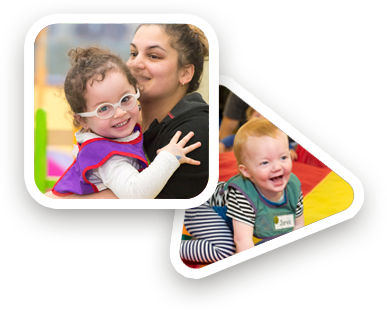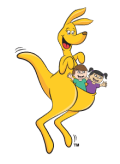Dr Jane Williams and Dr Tessa Grigg
Covid-19 is leaving a mark on our children1. There are reports of increased anxiety and neurodevelopmental delays. However, we know that GymbaROO-KindyROO kids have an excellent chance at being generally happy for life. As well as setting children up for academic, sporting and behavioural success, GymbaROO-KindyROO also, very importantly, lays the foundations for emotional development and the ‘happiness factor’ which is, for many, the most important of all. During a pandemic there is even greater focus on emotional wellbeing. The GymbaROO-KindyROO experience is a happy, colourful and positive one, with babies, children and parents loving the ‘in the moment’ fun of the classes, but underneath all the fun we are having there is deeper emotional development going on. To understand how our program contributes to long-term happiness and emotional development we need to look at the science behind it all.
The science behind happiness
Active movement in the first years of life plays an important role in how well a child will respond to the emotional ups and downs of life. However, the pandemic has created some new challenges for parents.1 Neurological issues are being discovered as there is an increase in the number of children exposed to COVID-19. This information needs to be mixed with interesting research that points to the effect of movement on ‘genetic expression’ and how this affects emotional control and responses. Movement also plays a part in the wiring of the emotional systems in the brain through the stimulation of the motivational system that gives us drive and confidence to learn new tasks, even if they are a bit tricky! Children who develop the ability to control and regulate emotions are happy and enjoy life more as they can cope with the emotional ups and downs of every-day living.
The first years of life are particularly important as this is when the brain is busy ‘wiring up’ and creating the essential connections that enable them to think and emotionally respond at a higher cognitive level when they are older 2. Children who engage in a daily exercise program improve not only in their physical capabilities, literacy and numeracy, attention, concentration, classroom coping skills, social sensitivities and playground behaviour but also in their emotional skills3–
How does movement affect emotional development?
Active early movement experiences impact on the development of emotions in two key ways, firstly through the effect of certain chemicals on our genes and secondly, via the emotional and motivational system in the brain.
Genes, genetic expression and movement
The structure of our genes, or DNA, is fixed for life. There is nothing we can do to control the impact it has on our health and wellbeing. But every gene has a ‘switch’ or a ‘landing strip for chemical messengers that can attach to the DNA, and which messengers ‘land’, determines what gene is activated and how it is able to express itself. In this way the brain actually writes social processes into biological processes. Emotional and psychological experiences can affect epigenetic structures negatively or positively for the long term 4.
For example, relationship experiences can affect genetic activity. In one study, they scanned the brains of three to five year olds who attended Day Care and looked at the volume of neurons in the hippocampus at seven years old. The researchers found that children who had high support from their mother, or primary carer, had higher volume of neurons in the hippocampus, important for memory and learning. They also had a decreased incidence of depression 4.
Movement and the development of the motivation system in the brain

While love and security are fundamental to emotional security and maturity, children also need to be able to actively explore and learn on their own to develop the ability to regulate their own emotions. Emotional regulation means children learn to cope with the good and not so good of every-day life.
Exploring through movement is essential for the regulation of the central nervous system as well as the emotional/motivational system of the developing brain. When children exercise they reduce the level of stress hormones, such as cortisol, and increase the release of ‘feel good’ hormones, or endorphins. If the brain is not bathed in enough endorphins then, stress systems are activated and children feel increased angst, depression and/or aggression 5.
Interestingly, young children need to experience some low levels of stress. They need to feel what it is like to be stressed and be able to learn how to ‘work through the process’ of reducing stress. This is how a child learns to cope with the ups and downs of every-day life. If an adult constantly helps a child avoid stressful experiences or ‘fixes’ the stress up for the child, then children really struggle to manage emotions when they leave their parent’s side. Never experiencing stress is as detrimental for emotional development as too much stress because children do not learn to be patient, or to cope with the challenges they face, and this decreases emotional regulation and control 5.
The challenge for families today is getting the balance right. It’s important to strike a balance between needing love and security and being able to explore the world and learn on our own. This works to develop the healthy emotional ‘regulation’ system of the brain.
How we help develop emotional maturity at GymbaROO-KindyROO
- Our program incorporates lots of physical exercise and movement activities that lead to motor maturity and motor skill development.
- Parents, or carers are actively involved in program, providing support, love and security while children tackle new challenges and learn new skills.
- Children feel safe in the structure and routine of the program and feel confident to explore and attempt new tasks.
- Children have the time to learn a new task through trial and error. Not getting right the first time, in the company of a supportive adult or mentor, gives children the opportunity to develop patience and to cope with the challenge of learning to get it right with practice.
- Accomplishing a new task gives children a positive feeling about themselves, their ability and what they can achieve into the future.
- The GymbaROO program promotes success and successful children are happy children.
GymbaROO-KindyROO and you, making the world brighter and happier one child at a time.
Dr Jane Williams (PhD, BMgt, RN(Paeds)) is a Director for GymbaROO- KindyROO. Dr Williams is one of Australia’s leading experts on baby and child development.
Dr Tessa Grigg (PhD, Dip Tchng ECE and Primary) is the Research and Education Manager for GymbaROO-KindyROO and a part-time lecturer at the University of Canterbury, NZ.
References:
- Stafstrom, C.E., Neurological effects of COVID‐19 in infants and children. Developmental Medicine & Child Neurology, 2022. 64(7): p. 818-829.
- Diamond, A., Interrelated and interdependent. Developmental Science, 2007. 10(1): p. 152-158.
- Diamond, A., Close interrelation of motor development and cognitive development and of the cerebellum and prefrontal cortex. Child Development, 2000. 71(1): p. 44.
- Bauer, J., Basal neurobiological systems behind the psychological development of children: motivation, stress, mirror neurons and aggression, in International INPP Conference. 2014: Vienna, Austria.
- Williams, J. and P. Holley, Linking motor development in infancy and early childhood to later school learning. Australian journal of child and family health nursing, 2013. 10(1): p. 15-21.

